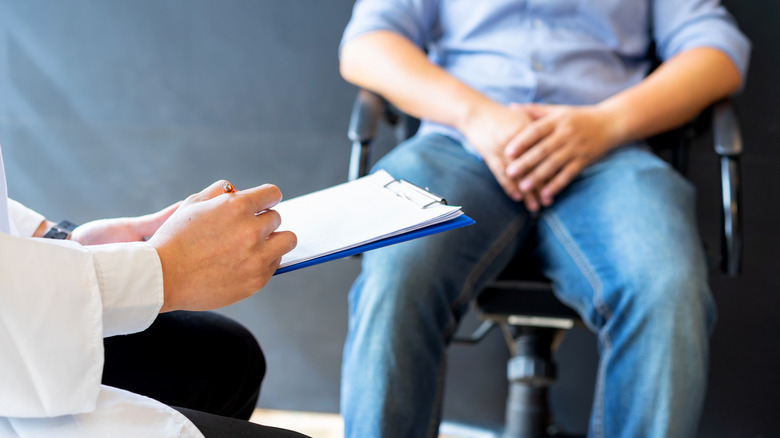Sitting Too Much Has An Unexpected Effect On A Man's Prostate
The prostate is a small gland that sits in front of the rectum and underneath the bladder. It's the prostate's anatomical position that leaves it vulnerable to pressure when a man is sitting down — and all that pressure can be more than just annoying. It may lead to chronic or acute medical conditions. Unfortunately, many men sit for several hours each day. In fact, per a 2022 study in Medicine & Science in Sports & Exercise, the average person spends 9.5 hours in a sedentary position, such as sitting in a chair or a vehicle.
Sitting can be especially troublesome if a man has a relatively sedentary job. As board-certified urologist Dr. S. Adam Ramin shared (via U.S. News and World Report), during and after Covid, he saw an uptick in male patients whose sedentary habits (e.g., working remotely and sitting for long periods) led to prostate and nearby reproductive organ discomfort and pain. What was Dr. Ramin's explanation for why sitting was so tough on his patients' prostates? "Humans weren't designed to sit around."
This doesn't mean that all men who sit regularly for work or leisure will experience prostate problems. However, since two issues — prostatitis and prostate cancer — do seem to have potential connections to sitting, men may want to know more about the science behind the phenomenon.
Sitting-related prostate concerns
Prostatitis (swelling of the prostate) can be caused by an infection and treated with medications, according to the Mayo Clinic. Yet it can also occur in the absence of an infection. And if a man is sitting a lot, he may be at a higher risk of having prostatitis due to consistent pressure, per WebMD.
Interestingly, the older a man gets, the more likely he is to be diagnosed with prostatitis anyway. Therefore, it's not necessarily sitting that leads to the list of common warning signs of possible or diagnosed prostatitis from the National Institute on Aging, like urination urgency, discomfort during urination, or pain in the pelvic region. But if a man's prostate becomes swollen because of something other than an infection or age, he might want to speak with a healthcare professional about changing his sedentary habits.
Prostate cancer can also arise as a concern for men who sit. A 2018 study in PLoS One supports the possible link between sitting and cancer. After following the medical history of 38,154 adults for 16 years, researchers determined that those who sat more than eight hours daily increased their chance of prostate cancer by 22%. And in a 2021 analysis in the Journal of Clinical Oncology, men who held sedentary jobs exhibited higher prostate-specific antigen (PSA) levels. Though PSA levels aren't sure signs of cancer, they can indicate an increased risk of developing prostate cancer.
Activity to reduce some prostate health risks
Ultimately, researchers are just beginning to understand why sitting could have so much influence on prostate cancer. However, when interviewed for the Cleveland Clinic, oncologist Dr. Dale Shepard felt that excess weight gain might be a deciding factor. Said Dr. Shepard, "Sitting is a correlate of obesity — and having obesity is a risk factor for certain types of cancer."
Is it possible to mitigate sitting's negative effects on the prostate? Yes, according to some clinical evidence. For example, a Journal of Physical Activity and Health study cited in a Men's Health article showed that men who engaged in at least an hour of light physical activity each day reduced their risk of having an elevated PSA level by 18%.
Even men who've already been diagnosed with prostate cancer may be able to slow its progression by moving around more. As a 2024 review in Advanced Exercise and Health Science concluded, exercise may be a key to slowing down prostate cancer tumor growth, if animal experiments are any indication. Similarly, findings from a 2024 review in Cancers revealed that an increase in physical activity could cause patients to experience better prostate health. Consequently, men who want to keep their prostates in the best possible health may just need to stand up more often.


